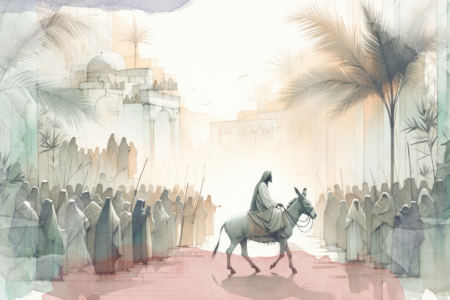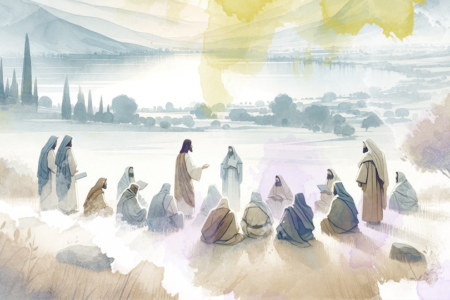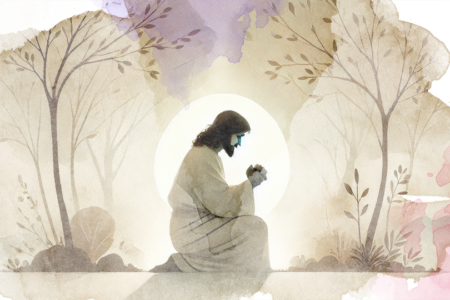The Life, Times And Message Of Isaiah The Prophet Jun/Sep 1971
ISAIAH 42
The Servant in Whom the Lord Delights Contrasted With the Blind and Deaf Servant
1-4 Jehovah’s faithful and obedient servant
1 Behold my servant, whom I uphold,
My chosen one, in whom my soul delights,
I have put my spirit upon him,
That he may bring forth justice to the nations.
2 He will not shout aloud, nor lift up,
Nor make his voice to be heard in the street.
3 A bruised reed he will not break,
And the smouldering wick he will not crush.
But will bring forth true justice.
4 He will not fail nor falter,
Until he will have established justice on the earth,
And for his law the islands shall wait.
Comment:
1 Behold my servant
The identity of “the servant of Jehovah,” has for many centuries been the subject of a heated controversy. In this passage “the servant” clearly appears to be an individual personality, chosen and appointed by Jehovah to bring salvation to Israel and to be a light to the nations. However, further in this chapter (v. 19 ff), “the servant of Jehovah” is distinctly Israel as a people, about whom the Lord complains that they are blind and deaf, unfaithful and hard of understanding. Many Jewish and liberal Christian commentators have maintained that “the servant of Jehovah” always refers to Israel, either as a collective body, or to “ideal Israel,” or to “a faithful remnant of Israel.” Nevertheless the majority of the ancient Jewish scholars have interpreted Isaiah 42:1-4 and other related passages, as referring to the Messiah
Thus, the Palestinian Targum, an ancient Aramaic paraphrase of the Old Testment, renders “Behold my servant” as “Behold, the Messiah my servant.” The difficulty in the proper identification of “the servant” is due to the fact the same adjectives are often applied both to the servant as a people, and to the servant as a person. Delitzsch explains the seeming contradiction by comparing Israel to a pyramid, the base of which is the whole of Israel, the central part is the spiritual remnant and the apex is the personal mediator of salvation, the Messiah, who is destined to accomplish that which Jehovah intended Israel to be, but was not.1
Usually the context of the servant passages make it quite clear whether “the servant” is collective Israel or the individual representative of true Israel, the anointed mediator and savior. In the second part of Isaiah there are four distinct Messianic “servant of the Lord” prophecies which apply to the person of the Messiah. These are Isa. 42:1-7, 49:1-6, 50:4-9 and 52:13, 53:12.
In addition Israel also is collectively referred to as the servant in chapter 41:3-16, 42:18-21, 43:10, 44:1-5, and v. 21. It is important that we at all times distinguish between the two types of “the servant of the Lord” prophecies or songs, as they are sometimes called.
The New Testament consistently applied the Messianic servant passages to Jesust, (Mt. 12:17-20; Lk. 2:32, 4:16-18; Acts 8:30-35).
In ch. 42:1-4, the servant of Jehovah is an individual personality, as in Isa. 11:2 , is endowed with the spirit of the Lord, and is called to establish true justice for all nations. The messianic servant of the Lord is humble, unobtrusive and compassionate (v. 2). He does not crush the weak or the broken, but heals them, (v. 3). He never wavers and is not crushed by his adversaries, nor by the enormity of his task, but will in the end accomplish his divinely appointed task (v. 4)
And for his law the islands shall wait.
The implied thought here is that in the hearts of all men there is an unconscious longing for the manifestation of God’s eternal Law, for His Truth and Justice, which the servant of the Lord will reveal to all nations.
The New Testament and the early Church saw in the servant passages a unique prophecy concerning Christ, remarkably fulfilled in the person of Jesus. Most Jewish and liberal Christian scholars have generally applied all these passages to national Israel. However, this interpretation does violence to the obvious sense of the text.
5.7 The servant’s task.
5 Thus says God who is Jehovah,
He who created the heavens and stretched them out,
Who spread out the earth and everything which grows out of it,
Who gives breath to the people that dwell upon it,
And the spirit to them who walk upon it.
6 I the Lord have called thee in righteousness,
I have taken hold of thy hand, I have kept thee,
And gave thee for a covenant to the people.
7 To open the blind eyes, to bring out the prisoners from the dungeon,
And from the prison house them who dwell in darkness.
Comment:
5-7 Thus says God who is Jehovah
With majestic solemnity Jehovah, the creator and sustainer of the universe, introduces His servant declaring that He has appointed him to be a covenant to the people Israel and for a light to the nations. The servant of this passage is to be a covenant to the people. This is “the covenant of peace” mentioned in Isa. 54:10 and “the eternal covenant” of ch. 61:8. It is also the new covenant promised in Jer. 31:31-34 and Ezek. 16:60. The servant will heal Israel from spiritual blindness. The personal character of the servant is clear, and presents sharp contrast to national Israel, who is still blind, and dwells in darkness in a spiritual dungeon (v. 7).
8-9 Jehovah Alone is God
8 I am Jehovah, this is my name!
I will not give my glory to another,
Nor my praise to idols!
9 The first things, behold have come to pass.
And new things I declare,
Before they spring forth I let you hear about them.
8 I am Jehovah, this is my name.
Jehovah alone is Lord and therefore is the guarantor that His servant will accomplish His mission.
9 . . . The former things . . . the new things . . .
“The former things” are the prophecies of the past which have already come to pass, “the new things” are the new prophecies which the prophet is now foretelling before the predicted events have come to pass. The acceptance of the truth of this assertion is basic to the understanding of predictive prophecy.
10-17 A New Triumphal Song
10 Sing unto the LORD a new song,
And his praise to the ends of the earth.
You that go down to sea, and all that which lives in it,
The islands and all its inhabitants.
11 Let the wilderness and its cities lift up their voice,
The villages where Kedar dwells,
Let the inhabitants of Sela sing for joy,
Let them shout from the top of the mountains.
12 Let them give glory to the LORD,
And declare His praise in the islands.
13 The LORD will go forth like a mighty man,
Like a man of war will stir up a battle frenzy,
He will raise a yell and a shout:
14 I have held my peace for a long time,
I have kept quiet and have restrained myself,
But now I will cry out like a woman in birth,
I shall gasp and puff at the same time.
15 I will lay waste mountains and hills,
And I will shrivel up all that which is green,
And turn rivers into islands, and dry up pools.
16 I will lead the blind by a way which they never knew,
And guide them through paths which they knew not.
The darkness I will turn into light before them.
And the crooked places straight.
These are the things that I will do, and will not forsake them.
17 They shall draw back, deeply ashamed,
All they who put their trust in idols,
Who say to molten images: “You are our gods!”
Comment:
“The new things” mentioned by the prophet in v. 9 now becomes the occasion for a new song, reminiscent of the triumphal hymn of Isaiah 26:14-15. The inhabitants of the coastlands and the desert oases are encouraged to sing a new song of praise to Jehovah (v. 10-12). The inhabitants of Kedar, an Arab tribe in Syria, and those who dwell in Sela, an Edomite city, are also invited to join in the praise of Jehovah. The occasion for this universal jubilation is that the LORD, who has kept silence for very long, is about to intervene with great might on behalf of Israel.
In this triumphal hymn Jehovah is compared to a mighty warrior who shouts and yells in the midst of a raging battle, and to a woman in pain about to give birth. These anthropomorphisms are intended to convey the fierceness of the diving wrath, when He finally intervenes on behalf of His people.
15 I will lay waste mountains and hills.
When God intervenes all of nature is affected, the mountains, the hills and the rivers. There is no obstacle which can stand in the path of God’s plan.
16 And I will lead the blind . . .
The whole purpose of God’s intervention is to bring home His people, in spite of their self-inflicted blindness.
These are the things which I will do and not forsake them.
Jehovah who hitherto has punished His people so severely, will now act in mercy.
17 They shall draw back, deeply ashamed, all they who trust in idols . . .
The vindication of God’s people will confound the idolators and the enemies of Israel.
18-21 The Deaf and Blind Servant of the LORD
18 Hear, you deaf:and you who are blind, look and see.
19 Who is as blind as my servant?
And who is as deaf as my messenger, that I send?
Who is as blind as my trusted messenger,
Or as blind as the servant of the LORD?
20 You have seen much, but understood little,
You have open ears, but do not hear!
21 Yet it pleased the Lord, for the sake of his righteousness,
To magnify the law and to make it glorious.
Comment:
Without any doubt “the servant of the Lord” in this passage is collective Israel. Jehovah reproaches him that he is deaf and blind. He has seen so much, yet never really understood the significance of what he has seen. He has heard much but has proved himself incapable of comprehending the meaning of what he has heard. Like a trusted messenger (Hebrew “meshulam”) Israel was sent on a mission to the nations, but has proven himself unfaithful to his trust.2
21 It has pleased the Lord for the sake of his righteousness. . . .
In spite of Israel’s blindness and unfaithfulness, the Lord is determined to accomplish His purpose to make His Law glorious and supreme in the eyes of all mankind. What Israel, as a people, has failed to accomplish, the faithful servant, the Messiah will. In this very chapter (v. 18-21) where the servant Israel is portrayed as blind, deaf and disobedient to God, the personal servant of God is strayed as completely obedient and well pleasing to Jehovah (v. 1-6). The distinction between the two servants is clear and beyond the possibility of confusion.
And yet there is an umbilical cord between both types of “the servant.” Both are rooted in God’s choice of Israel as His people, and in His covenant with them. In the final analysis Christ, the servant of Jehovah, is the perfect representative of Israel who restores the broken covenant relationship between Jehovah and His people. In this sense Israel and her Messiah are one.
22-25 The reason for Israel’s pitiful plight.
22 But this is a people robbed and plundered.
All of them are trapped in holes,
Hidden away in dungeons.
They have become a prey, and there is none to deliver,
A spoil, and there is none to say: “give back!”
23 Who among you will listen and pay attention against a future time?
24 Who gave Jacob for a spoil and Israel to the robbers?
Was it not the LORD against whom we have sinned?
And in whose ways they would not walk,
Neither were they obedient to his law?
25 Therefore did he pour out upon them his scorching wrath and the fury of war,
It enveloped him in flames, yet he did not know it,
It burned him, yet he laid it not to heart.
Comment:
22-25
Israel’s pitiful situation as a plundered and robbed people is the consequence of their obstinate refusal to obey Jehovah. As a result Jehovah Himself brought upon them all their disasters. In spite of all this, Israel has failed to learn her lesson.
23 Who of you will listen and pay attention against a future time?
The prophet pleads with His people to learn from their own tragic history, in order to benefit from it in the future.
25 Therefore did he pour out upon them his scorching wrath and the fury of war.
Israel’s national disasters were no mere accident but the result of divine wrath. They themselves have provoked the divine wrath, and yet in their blindness have failed to understand this basic truth.
ENDNOTE
- Delitzsch Commentary to Isaiah, Vol. 2, pages 174-175 (Eerdmans)
- The Hebrew adjective “meshulam”—” a trusted one” or “confidant,” is related to the Arabic term “muslim.”







